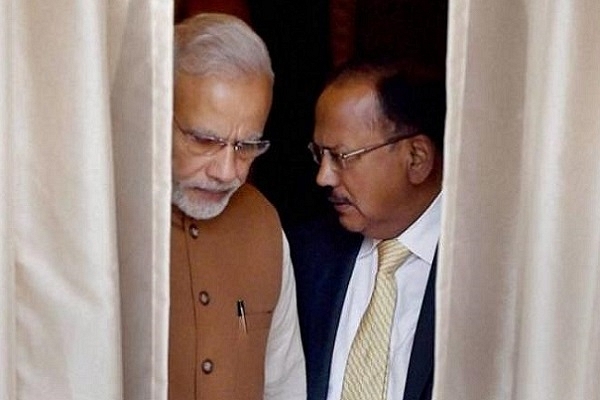Insta
Shrouded In Secrecy: Just Seven People Knew About IAF Air Strike’s Timing After PM Modi Approved It On 18 February

Narendra Modi with Ajit Doval (Pic via Twitter)
Only seven officials of the Indian government were aware of the developments leading to the Indian Air Force (IAF) strike in Balakot in the early hours of 26 February, reports Hindustan Times (HT).
Apart from Prime Minister Narendra Modi and National Security Advisor Ajit Doval, the three service chiefs - Army chief Bipin Rawat, Navy chief Sunil Lanba and Air Chief B S Dhanoa - the chief of RAW Anil Dhasmana and head of Intelligence Bureau Rajiv Jain, were the only ones in the know-how.
To ensure maximum secrecy and protect the security of those involved in the mission, only those directly involved with the mission were kept in the loop.
After the Pulwama terrorist attacks in Kashmir in which 44 CRPF jawans were killed, Research and Analysis Wing (RAW) was asked to identify terrorist targets in Pakistan to preempt further terrorist attacks. Balakot was selected as it housed the most extensive training camp of Jaish-e-Mohammad (JeM), the group behind the Pulwama attacks.
PM Modi approved the strike on 18 February (2019).
Mission Successful
Following this, a fleet of 12 Mirage jets of the Indian Air Force (IAF) struck JeM’s camps in Balakot at around 3:30 am on 26 February in a cross-LoC (Line of Control) air strike.
Later in the day, while addressing a meeting of the Cabinet Committee on Security (CCS) in New Delhi, the National Security Advisor (NSA) Ajit Doval revealed that up to 25 top commanders of the Jaish-e-Mohammed (JeM) had been eliminated in the operation.
Support Swarajya's 50 Ground Reports Project & Sponsor A Story
Every general election Swarajya does a 50 ground reports project.
Aimed only at serious readers and those who appreciate the nuances of political undercurrents, the project provides a sense of India's electoral landscape. As you know, these reports are produced after considerable investment of travel, time and effort on the ground.
This time too we've kicked off the project in style and have covered over 30 constituencies already. If you're someone who appreciates such work and have enjoyed our coverage please consider sponsoring a ground report for just Rs 2999 to Rs 19,999 - it goes a long way in helping us produce more quality reportage.
You can also back this project by becoming a subscriber for as little as Rs 999 - so do click on this links and choose a plan that suits you and back us.
Click below to contribute.
Latest